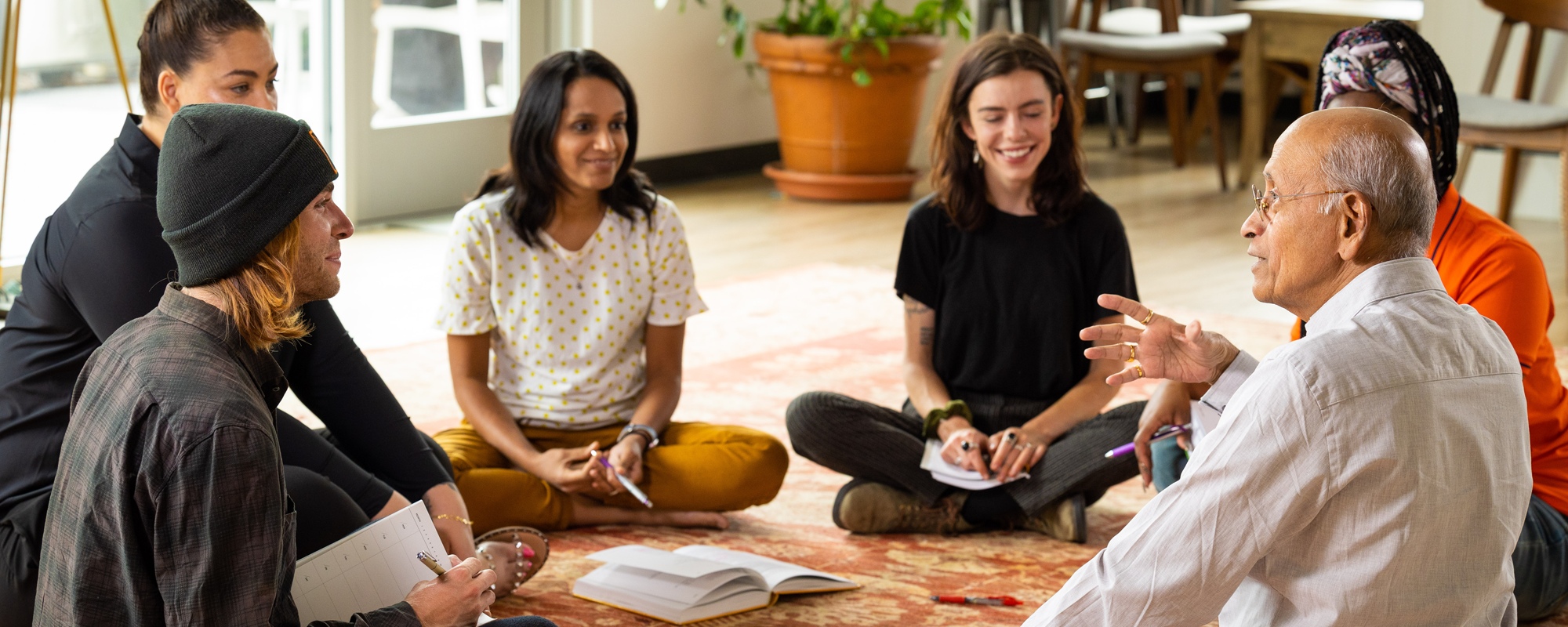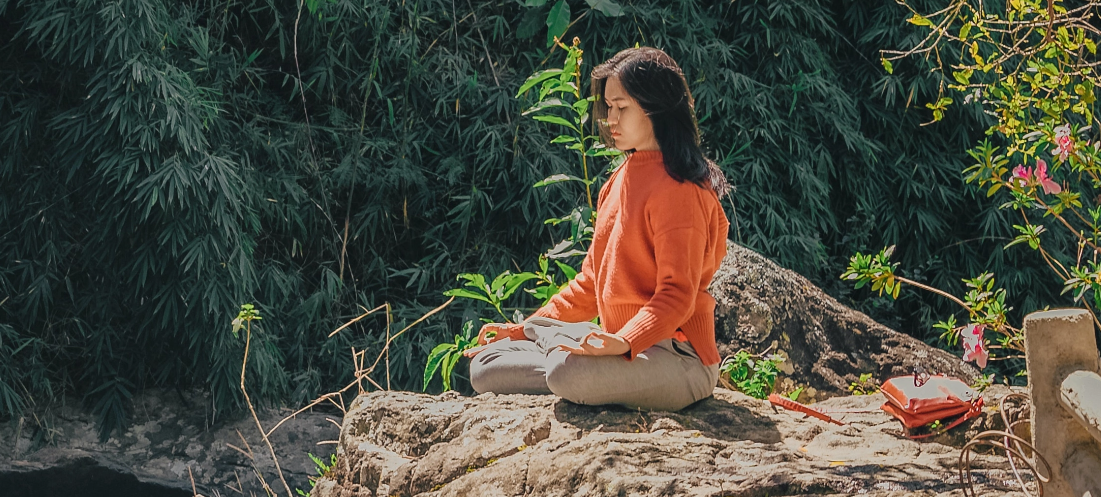
- AHC, AP, Ayurveda, Ayurvedic Doctor, Ayurvedic Health Counselor, Ayurvedic Practitioner, Bachelor of Ayurvedic Medicine and Surgery, BAM&S, Certification

Have you just learned about the magic of this ancient healing science from India?
Are you wondering, “How can I study Ayurveda here in the United States?” and “Can I study Ayurveda online?”
What are the differences between the various levels of certification, their scope of practice, and opportunities post-graduation?
And how is a degree in the U.S. different from a BAMS degree in India?
Let’s get into it.
According to the National Ayurvedic Medical Association (NAMA), within the United States there are three primary levels of learning and practicing Ayurveda: Ayurvedic Health Counselor, Ayurvedic Practitioner, and Ayurvedic Doctor.
We’re going to explain the NAMA certification requirements for each of these respective levels, their scope of practice, how they compare to a BAMS program in India as well as the nuances we can speak to regarding the programs provided at the Ayurvedic Institute (which is, in our opinion, the best place to study Ayurveda in the U.S. 😉).
So let’s begin where Ayurveda did, in India.
Training: The first four years of a BAMS program feature mandated curriculum on core subjects, specializations, and practical labs. The last year involves conducting research and creating a thesis or research project, followed by an internship in the final year.
Length of Study: BAMS is a five and half year long undergraduate degree. Applicants must first pass the National Eligibility Entrance Test (NEET), which is the standard pre-medical entrance examination. All BAMS programs are overseen by the Central Council of Indian Medicine (CCIM).
Scope of Practice: The scope of practice of a BAMS degree in India is expansive, including various general surgeries and use of an incredibly wide array of herbal compounds, metals, and minerals.
Opportunities Post-Graduation: After completing the BAMS course, students are able to find work in the private or government sectors, including Ayurvedic clinics, hospitals and pharmacies. There are also abundant opportunities in the education and academic sector. Many countries outside of India now also recognize BAMS degrees. The United States, however, currently does not.
Training: This field of Ayurvedic professionals is trained in prevention and promotion. They have undergone at least 600 hours of training and have a minimum of 50 supervised client encounters. They also have 4 credits of college level anatomy and physiology or the equivalent.
Length of Study: Full-time programs are generally a year long, however there are many online options as well that allow you study Ayurveda at a slower pace.
Scope of Practice: Health Counselors work within the scope of diet and lifestyle, including pranayama (breathwork) and meditation. They may also use a very limited number of basic Ayurvedic herbs and mixtures, such as triphala.
Opportunities Post-Graduation: Post graduation opportunities include seeing clients in a private practice as well as finding niche Ayurvedic positions in the fields of yoga, copy-writing, food and beverage, social media, education, research, panchakarma, and product development. For more details on these possibilities, check out this blog post.
The Unique Ayurvedic Institute Experience: The full-time yearlong program to study Ayurveda at the Ayurvedic Institute is a transformative, immersive experience that builds a comprehensive foundation of the fundamental principles and concepts of Ayurveda while remaining firmly rooted in the spirituality of this ancient science.
Ayurveda was revealed to the rishis – the ancient seers – through meditation and then passed down orally for thousands of years, which the Vedic style of teaching by founder and director of the Ayurvedic Institute, Vasant Lad, BAM&S, MASc, poignantly reflects.
ASP1 at the Ayurvedic Institute is thus the year when the spirit of Ayurveda – Ayurvidya – dances and sings her way into your being through Vasant Lad’s teachings, the singing of sanskrit sutras, and the powerful container created by the school and faculty.
You can currently study Ayurveda online at the Ayurvedic Institute! But you must attend live classes, which are mandatory. Contact admissions@ayurveda.com for more details.
Curious if being an Ayurvedic Health Counselor is right for you? Check [link to Benefits of being an Ayurvedic Lifestyles teacher].
Training: Ayurvedic practitioners possess full clinical training in the pathology of disease through the Ayurvedic lens and disease management. They have undergone at least 1500 hours of training and a minimum of 150 supervised client encounters as well as 6 credits of college level A&P or equivalent (these can include the hours, encounters, and credits accrued during the Ayurvedic Health Counselor (AHC) program). Like AHCs, Ayurvedic Practitioners also serve in prevention and promotion of health.
Length of Study: Full-time programs tend to be 2 years long, whereas some online or hybrid programs may offer much longer, slower paced curriculum (this includes the first year of AHC level).
Scope of Practice: Building off of the scope of Ayurvedic Health Counselors, which includes diet, lifestyle, basic Ayurvedic herbs and mixtures, pranayama and meditation, Ayurvedic practitioners are able to use all Ayurvedic herbs legal within the U.S. as well as foundational yoga postures (more if they have been certified in yoga).
Opportunities Post-Graduation: Post graduation opportunities include seeing clients in a private practice as well as finding niche Ayurvedic positions in the fields of yoga, herbology, copy-writing, food and beverage, education, social media, research, panchakarma, product development, and integrative medicine.
The Unique Ayurvedic Institute Experience: The Ayurvedic Institute’s second year Ayurvedic Practitioner level program gives both the allopathic and Ayurvedic perspective on pathologies, as Vasant Lad, BAM&S, MASc feels that integrative medicine and having a fluid understanding of both perspectives is best for the client, the practitioner and the spread of Ayurveda for the betterment of all. In addition to pathophysiology and clinical assessment of srotamsi (the channels of the body), there is also a continuation of Sanskrit, Ayuryoga®, an introduction to Jyotish, and the study of pulse in this second year program.
*Use of the title “doctor” might be limited by individual state regulations, but that title is used by NAMA to delineate the highest level of professional Ayurvedic education in the USA.
Training: Ayurvedic Doctors have received more specialized training in both Ayurvedic medicine as well as Western allopathic medicine. They are best equipped to provide an integrative medical approach to their clients. Ayurvedic doctors have received a minimum of 4000 hours of training and at least 300 client encounters, both of which can include AHC and AP curriculum.
Length of Study: Doctorate program lengths tend to vary, but in addition to the AHC and AP programs, they are often 2 to 3 years of additional study and incorporate considerable research, often a thesis.
Scope of Practice: Although the scope includes that of AHC and AP, an AD is still not permitted to diagnose diseases – like AHCs and APs, they are taught to refer out appropriately. However, ADs are highly equipped to work integratively with Western medicine since they are well versed in all branches of Ayurveda as well as Western pharmacology and treatment. ADs also have significantly more clinical and research experience in the academic setting.
Opportunities Post-Graduation: In addition to the opportunities of AHCs and APs, they are well-trained to run panchakarma or Ayurvedic cleansing programs, see clients in a private practice, work in the academic or research sectors, teach in Ayurvedic schools, work with herbs in product development, and work integratively with allopathic doctors to provide holistic care.
The Unique Ayurvedic Institute Experience: The Ayurvedic Doctorate program at AI is based on gaining practical experience in a variety of fields in which students can delve deeper post-graduation. Their immersive experiences include Ayuryoga®, panchakarma, private clinic, as well as a gurukula program in India, a Banyan Botanicals farm internship in Oregon, and a research project or thesis on the Ayurvedic topic of their choice.
As an Ayurvedic practitioner myself who has been through this decision process, if you feel excited and called to study Ayurveda (no matter what your logical brain or those around you may be saying!) and your gut is telling you to go-for it, I highly recommend you go for it!
And don’t feel obligated to commit to becoming an Ayurvedic Doctor from the beginning – start with an Ayurvedic Health Counselor course. As you are immersed in that experience, you will know if the next level of Ayurvedic Practitioner is right for you, and the same the year after that.
Vasant Lad, BAM&S, MASc always says that the only constant in life is change – so amidst the inevitably changing circumstances of your life, as you walk the path of Ayurveda, follow your intuition.
Trust that your inner voice and the teacher within will take you exactly where you are meant to go.

The spiritual journey starts here

Alex is an Ayurvedic Practitioner with AyurPrana, she supports Vasant Lad in his consultations, and she moderates AyurPrana’s seasonal cleanses. Alex is also a faculty member at The Ayurvedic Institute, where she teaches Clinical Assessment of Srotamsi and Pathophysiology II and manages student clinic. Alex loves kids, hot drinks, and frolicking in the sunshine.
Get regular updates from The Ayurvedic Institute, with great bonuses, free material, and discounts!
Contact